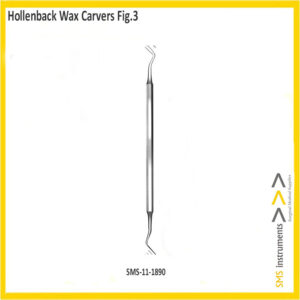Description
Thompson Carvers
Dental Instruments
Sizes:
1906 – Thompson fig 3
1908 – Thompson Fig 5
1910 – Thompson Fig 8
1912 – Thompson Fig 9
1913 – Thompson Fig 2
Thompson Fig 3, Fig 8, Fig 9
SMS Instrument Walls Fig 3 carver is a double ended, round handle dental instrument used for placing, carving and countouring amalgam.
Thompson Fig 5
SMS Tanner Fig 5 carver is a double ended, round handle dental instrument used for placing, carving and countouring amalgam and also Used to carve anatomical features and trim excess materials.
| Surname | Thompson |
| Tip Configuration | Blunt |
| Size / Model / Figure | Fig 2.3, 5, 8, 9, |
| curvature | Angled |
| Handle | Round Double Ended |
| Finishing | Mirror Polish Finishing |
| Instrument Type | Dental Wax Carver |
| Material | Stainless Steel |
| Disposable or Reusable | Reusable |
| Rusting Prevention | Passivation Processed |
| Cleaning | Ultrasonic Cleaned |
| Sterile or Non-Sterile | Non-Sterile |
| Latex or Latex-Free | Latex-Free |
| Test Performed | Boil, Shape & Performance Test |
| Grade | Premium OR-Grade |
| Packing | Individually Packed in SMS Brand printed Poly-sleeve |
Wax/Amalgam Carvers
A Dental Carver instrument used to shape a plastic material such as wax or amalgam. Amalgam Carvers are dental instruments used as part of restorative procedures to carve anatomical features and remove excess materials.
Types
Hand instrument with a blade or nib used to contour the surface of filling material in their plastic state, waxes, models and patterns.
Hollenback carver (knife edge-elongated –bibevelled)
Diamond (Frahm’s) carver: bibevelled cut edge
Ward’s “c” carver
Discoid cleoid
Interproximal carvers
Other carve with triangular nibs or diamond shaped nibs are also available.
Function
Hollenback carver
To contour and carve occlusal and interproximal anatomy in amalgam restorations. Double ended sharp stiff metal blade, sharp point; ends are protrude at different angles; carves other restorative material. Hollenback carver possess double- side knife edge point edge nibs with curved monoangled or binangled shank efficient in carving amalgam and wax.
Discoid cleoid carver
To carve occlusad anatomy into amalgam restorations. Double ended; discoid is disk shaped; cleoid is pointed, sharp. Discoid, cleoid carver used for direct gold restorations.
Ward carver
Pointed and sharp edge.
Both carver is used to remove the excessive material.
To produce the normal tooth anatomy
Interproximal carvers
This carver have very thin blades for carving proximal amalgam surface.
To pack and condense amalgam into interproximal areas of the cavity preparation.
Ends are sharped to fit in the mesial or distal box Smooth or serrated ends
Frahm’s carver
This carver is diamond carver for carving occlused surface an. the carver is kite shaped









